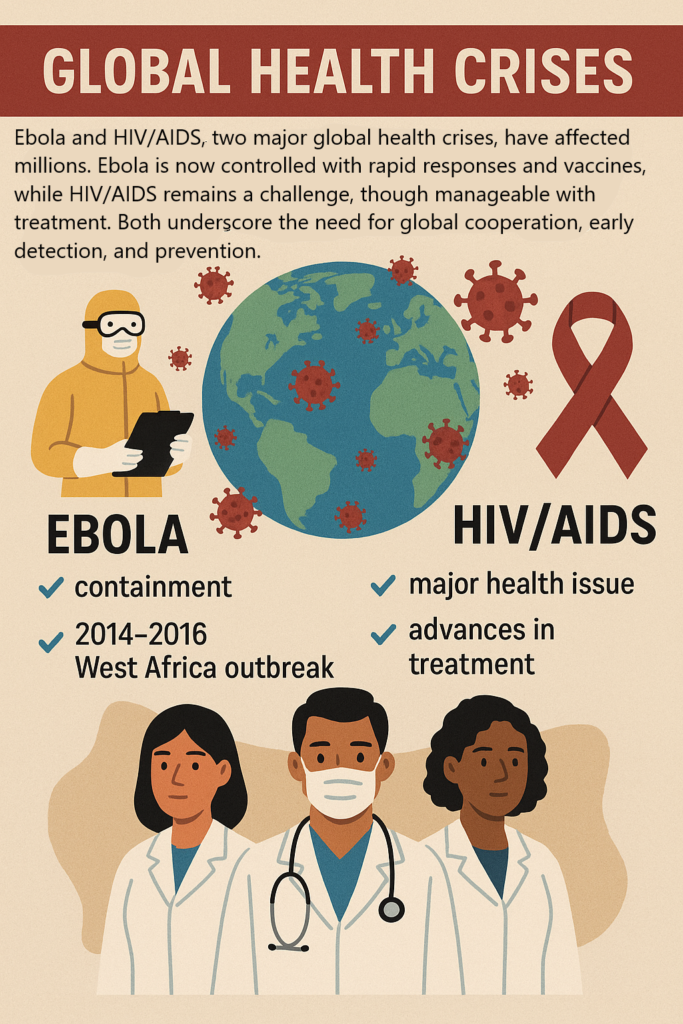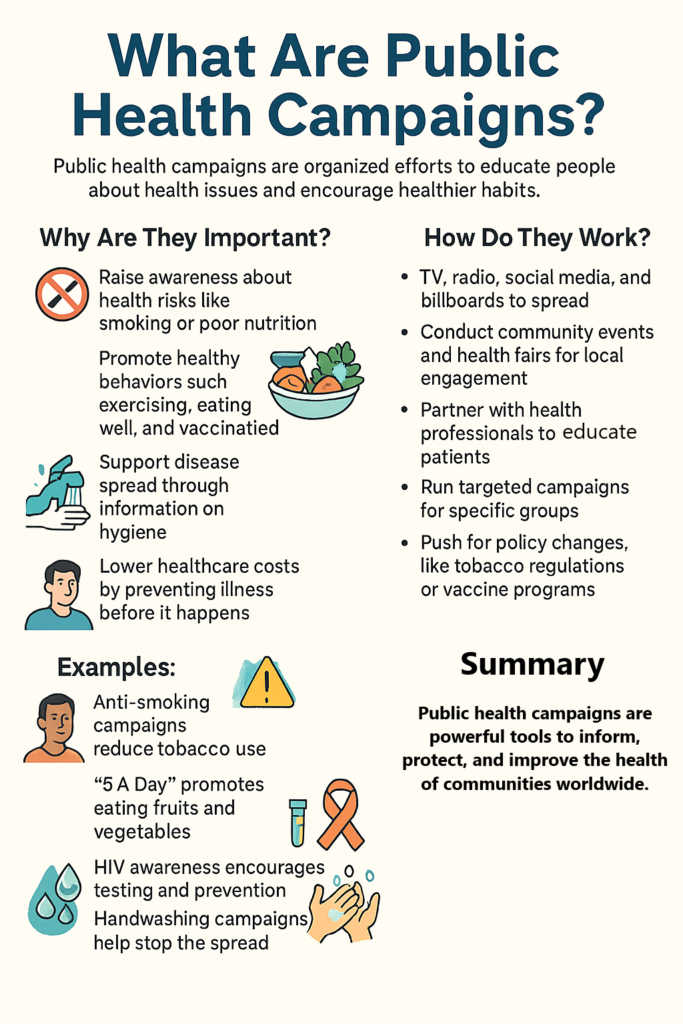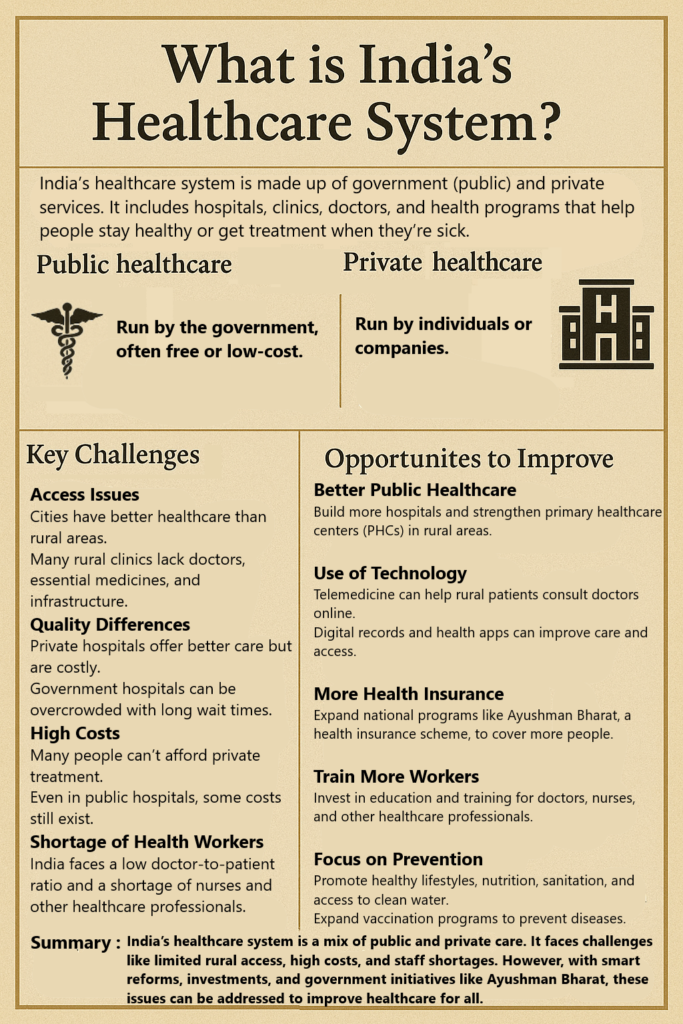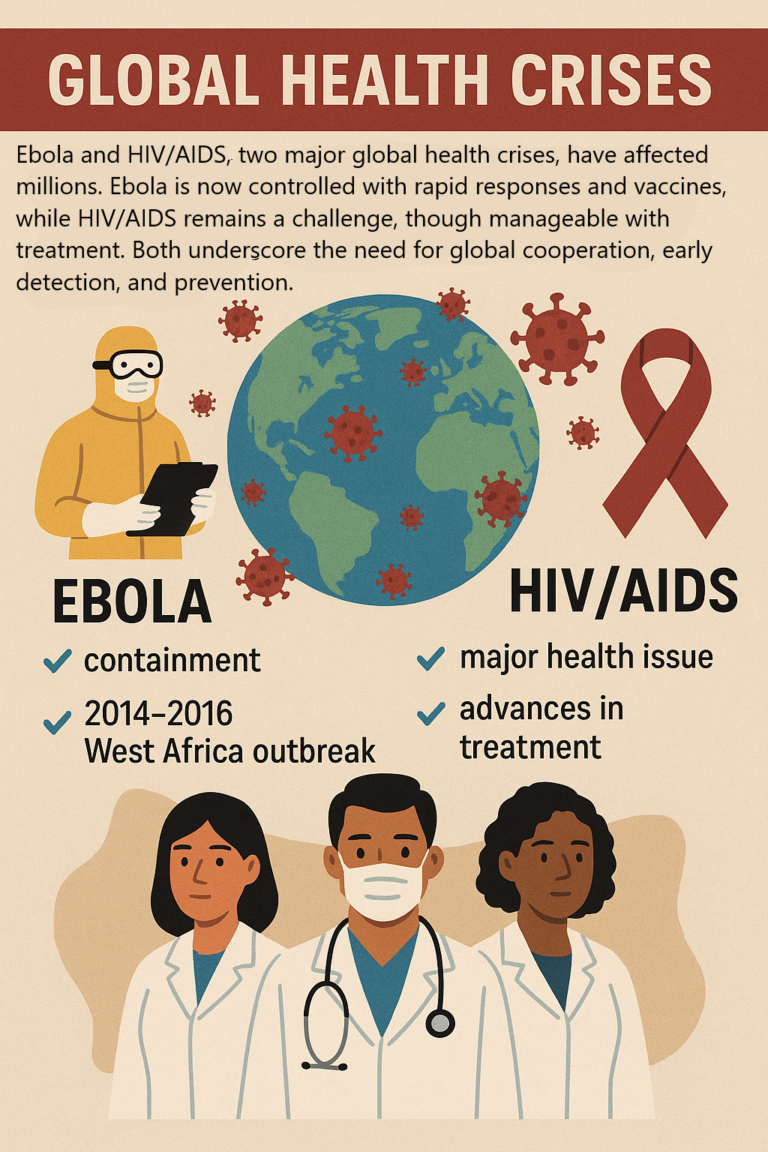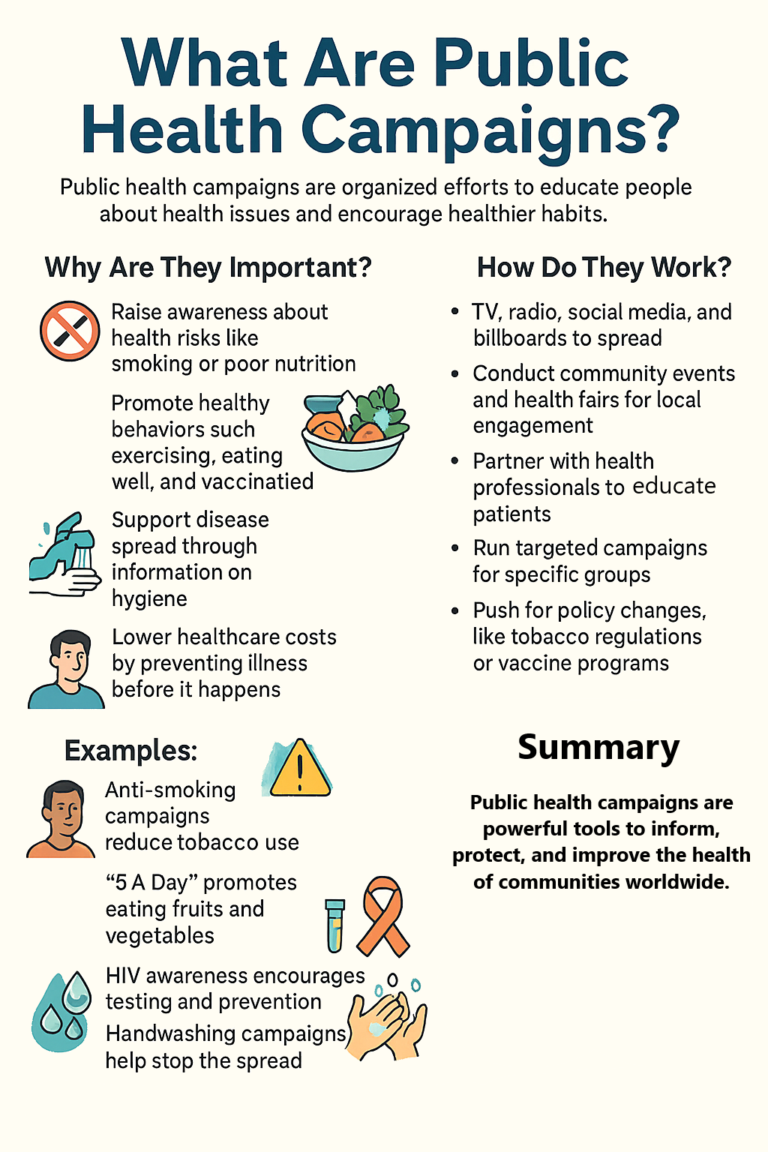Global Health Crises: Lessons Learned from Pandemics
Pandemics are large-scale outbreaks of infectious diseases that affect countries or even the entire world. The most recent example is the COVID-19 pandemic, but pandemics have occurred throughout history. From the Black Death to the Spanish flu and beyond, these global health crises teach us important lessons about how to better handle health emergencies. Here’s a simple breakdown of the key lessons we’ve learned from past pandemics:
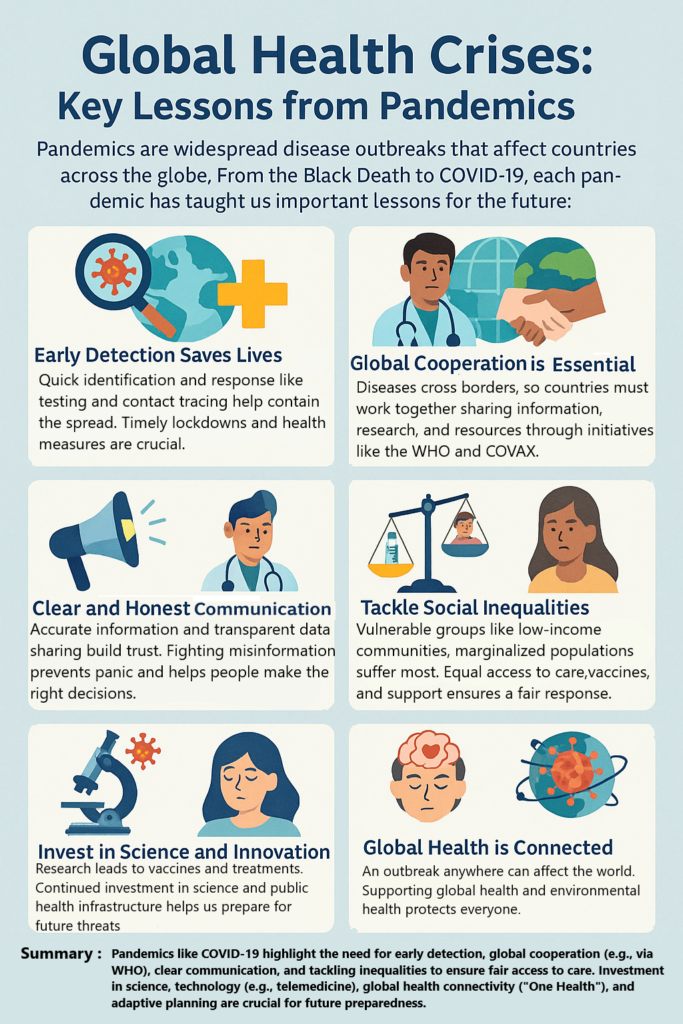
1. Early Detection and Quick Response are Crucial
- Detecting outbreaks early can save lives: The faster we identify a new disease or an outbreak, the quicker we can take action to control it. Early warning systems, such as disease surveillance networks, are vital in spotting new threats before they spread widely.
- Respond quickly and effectively: Pandemics can grow out of control quickly if not managed properly. Quick responses like lockdowns, travel restrictions, or social distancing measures can slow down the spread. However, these measures need to be well-planned and timely to be effective.
2. Public Health Systems Must Be Prepared
- Stronger healthcare infrastructure: Pandemics expose weaknesses in public health systems. Hospitals and clinics need enough resources, such as medical staff, equipment (like ventilators), and medications, to handle sudden surges in patients.
- Preparedness is key: Countries with strong public health systems are better able to manage pandemics. Having plans, equipment, and trained staff ready for emergencies can make all the difference in saving lives and preventing widespread chaos.
3. Global Cooperation is Essential
- Pandemics don’t respect borders: Diseases can spread quickly from one country to another, so global cooperation is critical. Sharing information, resources, and expertise between countries can help slow the spread of diseases and find solutions faster.
- Collaborative research and vaccines: In the COVID-19 pandemic, the global effort to develop vaccines was a huge success. Sharing data and working together in research allowed scientists to create vaccines in record time. This spirit of international cooperation is essential for tackling future health crises.
4. Clear Communication is Vital
- Accurate and timely information: One of the most important lessons from pandemics is the need for clear, transparent communication. Public health authorities must provide accurate information about the virus, how it spreads, and what people should do to protect themselves.
- Combating misinformation: During pandemics, misinformation and rumors can spread just as quickly as the virus itself. Governments and organizations must fight misinformation by providing reliable sources of information and addressing public concerns. This helps reduce fear and confusion, leading to better public health outcomes.
5. Addressing Social Inequalities
- Vulnerable populations suffer the most: Pandemics often affect the most vulnerable groups in society the hardest, such as low-income people, elderly individuals, and those with pre-existing health conditions. These groups might have less access to healthcare, face more exposure to the disease, or suffer more severe consequences.
- Equitable access to care: Pandemics teach us the importance of ensuring that all people, regardless of their social or economic status, have access to medical care, vaccines, and support. Addressing social inequalities is a crucial part of ensuring fair and effective responses to global health crises.
6. Importance of Scientific Research and Innovation
- Science and research save lives: Pandemics show how important it is to invest in scientific research. New medicines, treatments, and vaccines can only be developed through ongoing research and innovation. The rapid development of the COVID-19 vaccine is a perfect example of how science can provide solutions in a crisis.
- Ongoing preparedness: Research should continue even between pandemics, to prepare for the next one. For example, researchers are studying various viruses and improving diagnostic tools to respond more effectively in the future.
7. Mental Health Matters
- Pandemics affect mental health: During pandemics, people face not only physical illness but also emotional and psychological challenges. The fear of getting sick, social isolation, and economic hardships can all contribute to stress, anxiety, and depression.
- Support for mental well-being: We’ve learned that mental health support is just as important as physical health support during a pandemic. Providing access to counseling, stress-relief resources, and community support is crucial in helping people cope during health crises.
8. The Need for Flexibility and Adaptability
- Plans must be adaptable: No matter how much we prepare, pandemics often bring unexpected challenges. We’ve learned that strategies need to be flexible and able to change quickly as new information comes in. For example, if a virus mutates, health guidelines may need to be updated to deal with new variants.
- Adaptive responses are key: During the COVID-19 pandemic, governments had to adjust their approaches constantly—shifting between lockdowns, opening businesses, and introducing new rules as the situation evolved. Having adaptable systems in place is important for handling any crisis.
9. Global Health is Interconnected
- Health issues don’t stay in one place: One important lesson is that health crises can start anywhere and affect the entire world. Diseases like COVID-19 or Ebola show how interconnected the world is. If one region suffers, the effects can ripple out globally, affecting trade, travel, and social stability.
- Protecting global health is a shared responsibility: This teaches us that we must all invest in global health—not just for our own protection but to help protect others as well. Helping to improve healthcare infrastructure and access in poorer countries is key to preventing global health crises in the future.
10. The Role of Technology
- Technology aids in tracking and treatment: During pandemics, technology has been essential in tracking the spread of diseases, sharing real-time data, and providing virtual healthcare. Digital health platforms, like telemedicine, became crucial for continuing healthcare when in-person visits were limited.
- Innovative tools can speed up responses: The use of AI, machine learning, and mobile apps can help predict outbreaks, identify new viruses, and speed up vaccine distribution. Investing in technology will be important for future pandemics.
Conclusion:
Pandemics are challenging events, but they teach us valuable lessons. From the importance of early detection and global cooperation to the need for strong public health systems and clear communication, the lessons learned from past pandemics can help us be better prepared for future health crises. By improving our response strategies, investing in science, and addressing social inequalities, we can build a more resilient world that is ready to face global health challenges head-on.

